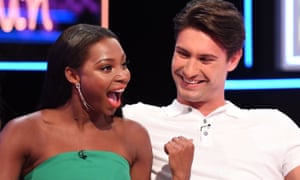Don"t scoff at Love Island. It"s British society laid bare
Two TV shows have been endlessly debated during the long, hot summer of 2018. One was a vacuous, pointless, and time-consuming programme where cartoonishly attractive, stupid people shagged endlessly in a tacky villa; the other a fascinating social experiment where the complexities of the heart, so often hidden from view, were laid out for inspection.
That is to say, no programme has split opinion like ITV2’s Love Island. But those who use the first description tend not to have seen it. Or, they dipped into one episode, caught a ridiculous challenge where the men performed a fireman striptease, and couldn’t fathom why this was ITV2’s most-watched show ever.
As someone who watched the second season by myself, when it was still very much a niche hit, I can tell you that the Love Island experience is not complete without people to talk about it with. It’s now a national conversation, lending itself to heated debate with your mates, your mates’ mums, your hairdresser, or perfect strangers.
Sure, most of us watch Love Island because it feeds an addiction to trash television and we’re extremely nosy about other people’s sex lives. I don’t see anything wrong with that and, taken simply on those merits, it really is one of the best programmes ever made. It won a Bafta for season three, and it’s fair to assume the people behind the programme are no less intelligent than those who think themselves too intelligent to watch it. But denying how much more there is to the programme’s appeal denies the power of mainstream television.
Even if you don’t “do” identity politics in your normal life, watching Love Island makes the complexities of British society so tangible they can’t be ignored. Whether or not you backed the #MeToo movement, you will have an opinion on whether Adam Collard was a misogynist. You don’t need to have read bell hooks to notice black contestant Samira Mighty being romantically sidelined, both by the male islanders and the show’s producers. And after eight weeks of watching Dr Alex being kept on a show that was about finding romance, despite failing miserably at all attempts, it was fair to assume that his fan base contained a lot of young men who can’t date women and are angry with them about it.

‘You don’t need to have read bell hooks to notice black contestant Samira Mighty being romantically sidelined, both by the male islanders and the show’s producers.’ Photograph: Jonathan Hordle/REX/Shutterstock
Considering how some people go blue in the face trying to convince people that race, gender and sexual politics matter, and are still a thing, what is there to gain from scoffing at Love Island? If a programme watched by 1.5 million 18- to 34-year-olds is prompting these difficult questions, I’m all for it.
Admittedly, I didn’t start watching so I could assess where we are with representation on UK television. And the Love Island WhatsApp group I’m in is more “is that a birthmark or makeup above Alexandra’s eye?” than “does this programme pass the Bechdel test?” But when you reflect on the 48 (yes) hours of the programme you’ve watched, a lot of uncomfortable truths are thrown into sharp focus.
The world the islanders inhabit seems unreal: everyone is thin and beautiful, no one seems to eat meals, and women are still considered “wife material” if they withhold sex from men (see Camilla from season three). But there is something very real about what the show tells us: the adverts that bookend the show might portray a rainbow Britain, but the show’s first black female contestant was immediately relegated to the “fun black best friend” that we were fed endlessly in 90s and 00s romcoms. You can’t move for mixed-race men in the villa, but that only seems to be because they are so many of the white women’s “type on paper”.
Body-positive activism is on the up, but we are still drawn to skinny women with big bums, and men with six packs. Fourth-wave feminism has told women they can be sexually liberated, but Megan Barton-Hanson, who was open about enjoying sex and worked as a stripper and glamour model, is still mortally offended when someone guesses her sexual-partner count at 37. Even winner and everyone’s favourite Dani Dyer says she won’t sleep with Jack so he can “look [her] dad in the eye”. Yes, that dad is Danny Dyer, but no one questioned the idea that she wanted to avoid having sex in front of millions of viewers not for herself, but for him (her mum wasn’t mentioned).
So yes, we should hold our TV creators to account, but we can’t let ourselves off the hook as we do it. Love Island, in its problems, is a reflection of society as it is, not as it should be. The show is basically a vacuous David Attenborough documentary, so simultaneously relatable and unrelatable that we can’t tear ourselves away. It will be interesting to see how much changes for season five next year. My guess is not a lot, but we’ll all be watching anyway, won’t we?
• Leah Green is a Guardian multimedia journalist
Source: https://www.theguardian.com/commentisfree/2018/jul/31/love-island-british-society-laid-bare
Comments
Post a Comment